人教版英语九年级SectionB话题阅读
Unit7SectionB2a2c教案人教版英语九年级全册
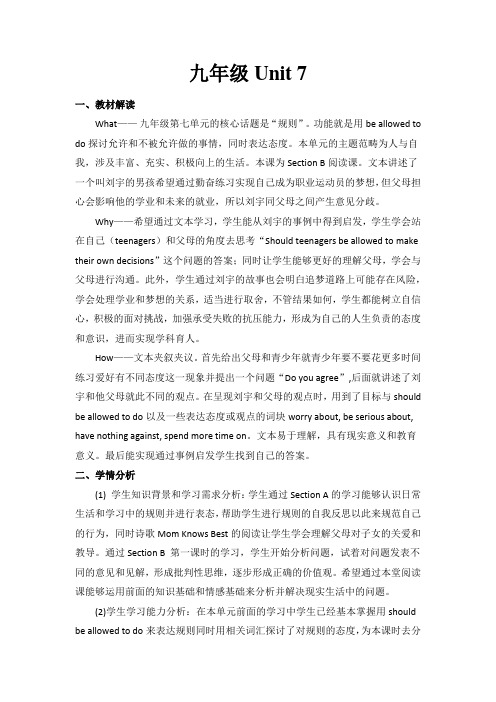
九年级Unit 7一、教材解读What——九年级第七单元的核心话题是“规则”。
功能就是用be allowed to do探讨允许和不被允许做的事情,同时表达态度。
本单元的主题范畴为人与自我,涉及丰富、充实、积极向上的生活。
本课为Section B阅读课。
文本讲述了一个叫刘宇的男孩希望通过勤奋练习实现自己成为职业运动员的梦想,但父母担心会影响他的学业和未来的就业,所以刘宇同父母之间产生意见分歧。
Why——希望通过文本学习,学生能从刘宇的事例中得到启发,学生学会站在自己(teenagers)和父母的角度去思考“Should teenagers be allowed to make their own decisions”这个问题的答案;同时让学生能够更好的理解父母,学会与父母进行沟通。
此外,学生通过刘宇的故事也会明白追梦道路上可能存在风险,学会处理学业和梦想的关系,适当进行取舍,不管结果如何,学生都能树立自信心,积极的面对挑战,加强承受失败的抗压能力,形成为自己的人生负责的态度和意识,进而实现学科育人。
How——文本夹叙夹议。
首先给出父母和青少年就青少年要不要花更多时间练习爱好有不同态度这一现象并提出一个问题“Do you agree”,后面就讲述了刘宇和他父母就此不同的观点。
在呈现刘宇和父母的观点时,用到了目标与should be allowed to do以及一些表达态度或观点的词块worry about, be serious about, have nothing against, spend more time on。
文本易于理解,具有现实意义和教育意义。
最后能实现通过事例启发学生找到自己的答案。
二、学情分析(1) 学生知识背景和学习需求分析:学生通过Section A的学习能够认识日常生活和学习中的规则并进行表态,帮助学生进行规则的自我反思以此来规范自己的行为,同时诗歌Mom Knows Best的阅读让学生学会理解父母对子女的关爱和教导。
人教版新目标英语九年级第三单元SectionBreading教案

Go for it! 九年级上
Unit 3
Could you please tell me where the restrooms are?
Section A (3a-3b)
一、教学内容:
本课是围绕He Wei 与Alice 去“Fun Times Park”游玩的过程展开对话。
二、学情分析:
1.学生具有好强的求知欲,本课的话题正符合他们的这一心理特点。
2.学生经过两年的英语学习,已经具备了一定的语言表达能力,但是学生平时的课余活动单一,本课内容契合孩子的兴趣点,开阔其眼界,并激发他们参与的积极性。
三、教学目标:
1、掌握本课单词及短语。
得体使用礼貌用语进行交流。
2、能够正确运用本课单词及短语以及运用多种方式转述语句。
3、培养学生有礼貌地与他人交往的能力。
在学习锻炼学生多多尝试新鲜或者有一定难度的事情。
四、重、难点:
本课单词、短语及运用多种方式礼貌的问询信息。
五、教法与学法指导:
1、通过听、说、读、写的操练使学生巩固本课短语、句子。
2、运用多媒体教学使教学内容更直观、具体。
六、教具:多媒体课件。
七、教学流程
八、教学反思:。
人教版九年级英语U12 SectionB reading教学设计

Unit12 Life is full of the unexpectedSectionB ( 2a~2e)教学设计一、课型:阅读课二、教学资源分析本单元以意外事件为话题,以陈述过去的事件为交际功能,重点在语境中学习和运用过去完成时,同时复习时间状语从句。
本课讲的是SectionB 有关愚人节的阅读阅读板块,就别人的恶作剧和愚人节进行讨论,来激活关于愚人节的相关背景知识,并要求学生通过归纳段落大意获取阅读信息,通过阅读回答问题获取更细节的信息。
同时教会学生充分利用自己已有的背景知识提高和加强获取信息的能力;同时还要多读书,积累更多的背景知识。
三、学情分析九年级是整个初中阶段的重要一年面临中考的升学压力。
学生在心理上、学习上各方面都发生了很大变化,学生差异会出现明显的分化,因而在教学面向全体学生的基础上更要注重分层教学,充分调动每个学生学习英语的积极性。
同时,九年级学生有升学的迫切需求,学习目的目的性明确,好奇心强,可以充分利用他们的特点,设置不同层次的“任务”的形式组织教学活动,让学生通过“用语言做事情”来学习和使用英语。
同时,运用活动教学法,让学生在活动中自主地完成任务,从而提高学生自主解决问题的能力和语言的综合运用能力,进而提高英语成绩。
四、教学目标:知识与技能:1、学生能够听说重点词汇和短语:discovery ,cancel ,believable ,disappear ,.sell out,lose weight,by the end of ,end up,get married...2、了解过去完成时,能够讲述过去发生的事。
方法与过程:1、根据语篇中的段落首句,激活相关背景知识,预测文章内容。
2、采用不同的任务形式来组织教学活动,让学生通过“用语言做事情”来学习和使用英语。
情感、态度与价值观(德育渗透):了解国外愚人节风俗,从文化差异角度体验、理解愚人节活动等西方传统节日,从而进行更有效的沟通和交流。
九年级英语上册(人教版)课件-Section B 话题阅读

阅读短文,回答下面的问题。 11.What's the biggest problem of learning a new language for most people?
ou may feel nervous when your new foreign language class meets the first
day.The teacher is speaking in a __1__ language,and stressing(强调) pronunciation.With these simple tips,you will be __2__ to learn a lot from
Listen to English songs.Music can be a very good way to learn English.The best way to learn it is to get the words of the songs you're listening to and try to read them as the singer sings.In this way you can practice your listening and reading at the same time.
( )C6.A.easy B.Difficult C.comfortable D.careful ( A)7.A.Review B.Practice C.Speak D.Read ( A)8.A.save B.Waste C.keep D.stop ( D)9.A.write B.Listen C.see D.watch ( )B10.A.roads B.Ways C.windows D.doors
人教版英语9年级全册Unit3_SectionB(2a-Self_Check)教案

B
a, “could you please tell me where the restrooms are? ”
b. “When is the school trip?”
c, “Excuse me, I wonder if you can help me.” or “I am sorry to trouble you, but....”
【通过本单元的学习学生需掌握哪些综合技能】
1.在不同场合下礼貌的使用语言。
2.结合不同文化背景得体的使用语言。
教学目标
语言知识目标:
1.通过教师的情景式导入和与学生互动的问答形式,学习和巩固该话题下的词汇句型,激发调动学生的求知欲,熟练使用以下词汇、短语和句型:
单词:polite, politely, speaker, request, choice, direction, correct, direct, whom, address, faithfully
在最后的自我检测部分,巩固复习本单元学习的重点词汇和句型。
教学流程
(详见相应教学设计)
教学评价
写进行礼貌地询问的宾语从句,写作内容逐渐发展到使用wh-疑问词引导的宾语从句询问各种问题,写作话题由国内身边琐事发展到国外生活资讯;写作篇幅由句子过渡到语篇,学会独立写作咨询信;最后在具体语境中复习巩固本单元学习的重点词汇和句型。其中前两个环节是循序渐进的,教学中一定要务实第一个环节,为第二个环节奠定基础。
情感态度价值观目标:
通过对本部分的学习,使学生能够了解英语中的礼貌用语。
教学重难点
教学重点:
用wh-疑问词引导的宾语从句礼貌地询问各种问题。
人教版九年级英语全册同步练习:Unit 1Section B 3a-Self Check

Period 5(Section B 3a-Self Check)一、阅读理解Your brain controls everything you do. It makes it possible for you to think, learn, create and feel; to blink(眨眼) and breathe and for your heart to beat—this fantastic control center is your brain. It is so amazing that a famous scientist once called it “the most complex(复杂的) thing we have yet discovered in our universe”.Can this small grey organ(器官), which weighs less than one and a half kilos, really do so much? Amazingly, your brain contains about 100 billion neurons(神经元)—it would take you over 3,000 years to count them all. Believe it or not, the activity in your brain never stops. Your neurons create and send more messages than all the phones in the world. And although one neuron creates only a little electricity, all your neurons together can produce enough electricity to power a light bulb(灯泡).So exactly how fast does your brain work? Well, imagine this: A bee lands on your foot. Neurons in your skin send this information to your brain at a speed of more than 240 kilometers per hour. Your brain then uses other neurons to send the message back to your foot to shake the bee off quickly. These neurons can send this information at more than 320 kilometers per hour. No computer has your brain's unbelievable ability to deal with the amount of information coming from your eyes, ears and other sensory organs.But how does your brain allow you to learn things that you will use in the future? The structure(结构) of your brain changes every time you have a new thought, remember or learn something. For example, riding a bike seems impossible at first, but soon you are able to do it. How? As you practice, your brain sends “bike riding”messages again and again. Soon, the actions are learned and you are able to ride a bike easily from then on.()1.From the passage we know that neurons ________.A.receive messages very slowlyB.are only found in your skinC.send messages to your brainD.need electricity to work()2.In Paragraph 3, the writer mentions computers to ________.A.compare them with the human brainB.show how fast they have becomeC.say that computers have no abilitiesD.ask people to use computers more()3.When you have a new thought, ________.A.your brain will power a light bulbB.your heart beats fasterC.you remember somethingD.the structure of your brain changes()4.The article is mainly about ________.A.all the steps when your brain learns thingsB.what an unbelievable organ the human brain isC.how the brain makes people smarter than computersD.the things you can do to make your brain work faster二、用方框中所给单词的适当形式填空express wise able increase conversation1.We only have a little time together, so we try to spend it ________.2.The ________ on her face told me that she didn't want to discuss it.3.The number of teachers in our school has ________ from 100 to 120.4.A sweet smile is the best way to show your kindness and start a(n) ________.5.After the accident she lost the ________ to walk.三、根据中文提示完成短文Last week, I returned from England after three months of living abroad as an international exchange student(交换生). Now, I have a wider 1________(知识) of Britain than before. I am very excited to share some of my fantastic experiences.You know I'm a(n) 2________(活跃的) person. I'm not afraid to speak 3________(大声地) in public. During my stay, I lived with a British host family named the Atkinsons. They were very nice and we got along well with each other. They have a son named George. He was 4________(出生) in the same year as me. As soon as I came to his family, he became my 5________(同伴) both in life and study. He told me that my 6________(发音) was excellent, but I made mistakes in 7________(语法) sometimes. So I decided to take a(n) 8________(笔记) whenever I made a mistake. This is the 9________(秘密) of my doing well in English.The Atkinsons were friendly. They always cooked delicious meals for me. And they taught me many interesting things that I could never learn from 10________(课本). I also made lots of friends. So, at the end of the third month, I almost didn't want to come back home!四、语法填空阅读下面短文,在空白处填入一个适当的词,或填入括号中所给单词的正确形式。
人教版九年级英语全一册全册完整课件
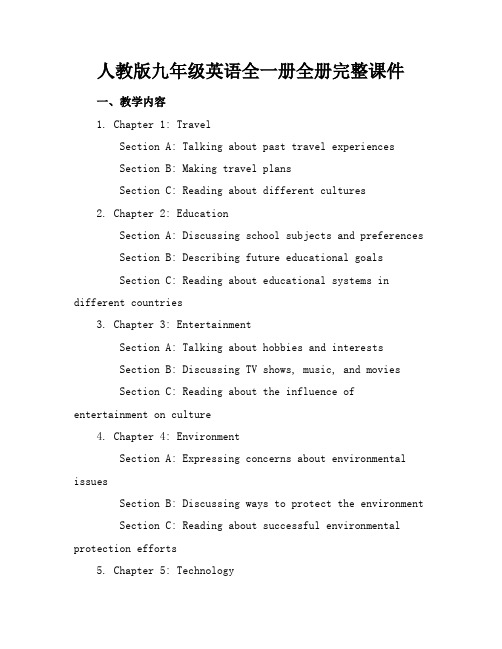
人教版九年级英语全一册全册完整课件一、教学内容1. Chapter 1: TravelSection A: Talking about past travel experiencesSection B: Making travel plansSection C: Reading about different cultures2. Chapter 2: EducationSection A: Discussing school subjects and preferences Section B: Describing future educational goalsSection C: Reading about educational systems in different countries3. Chapter 3: EntertainmentSection A: Talking about hobbies and interestsSection B: Discussing TV shows, music, and moviesSection C: Reading about the influence of entertainment on culture4. Chapter 4: EnvironmentSection A: Expressing concerns about environmental issuesSection B: Discussing ways to protect the environment Section C: Reading about successful environmental protection efforts5. Chapter 5: TechnologySection A: Using technology in daily lifeSection B: Discussing the advantages and disadvantages of technologySection C: Reading about technological innovations6. Chapter 6: HealthSection A: Talking about exercise and healthy habits Section C: Reading about the importance of mental health7. Chapter 7: JobsSection A: Discussing dream jobs and career aspirationsSection B: Describing job responsibilities and qualificationsSection C: Reading about successful entrepreneurs8. Chapter 8: CultureSection A: Exploring traditional festivals and customsSection B: Comparing different cultures and promoting cultural understandingSection C: Reading about cultural exchange programs9. Chapter 9: SafetySection A: Talking about safety rules and precautions Section B: Discussing emergencies and natural disastersSection C: Reading about safety education10. Chapter 10: Life GoalsSection A: Sharing life goals and aspirationsSection B: Setting realistic goals and planning for the futureSection C: Reading about inspirational individuals二、教学目标2. Cultivate students' ability to read and understand different text types.3. Enhance students' awareness of cultural diversity and promote cultural understanding.三、教学难点与重点1. Mastering target vocabulary and sentence structures.3. Improving speaking and writing skills throughpractical activities and reallife situations.四、教具与学具准备1. Multimedia projector2. Whiteboard and markers3. Handouts with vocabulary lists, reading materials, and exercises4. Recording devices for listening activities五、教学过程1. Warmup: Engage students in a brief discussion about the topic of the day.2. Presentation: Introduce new vocabulary and sentence structures through reallife examples and practice dialogues.3. Practice: Provide students with practical activities, such as roleplays, group discussions, and writing exercises.4. Listening and speaking activities: Play audio recordings, and guide students to practice their listening and speaking skills.5. Reading: Assign reading materials and guide students through skimming, scanning, and intensive reading exercises.6. Grammar focus: Explain and practice targeted grammar points.7. Production: Encourage students to create their own dialogues, presentations, or written pieces based on the topic.8. Summary: Review key points and answer students' questions.9. Homework assignment: Provide homework tasks and answer any questions.六、板书设计The board will display key vocabulary, sentence structures, grammar points, and a visual representation of the lesson's structure.七、作业设计1. Write a paragraph about your favorite hob, including why you enjoy it and how often you engage in it.Answer: (Student's paragraph)2. Create a dialogue between two friends discussing their future educational goals.Answer: (Student's dialogue)3. Read the article about successful environmental protection efforts and summarize the main points.Answer: (Student's summary)八、课后反思及拓展延伸Reflect on the effectiveness of teaching methods and student engagement. Consider incorporating additional resources, such as online videos, interactive games, or group projects, to enhance students' understanding and practical application of the topics covered. Encourage students to explore related topics beyond the classroom, fostering a love for lifelong learning.重点和难点解析1. 教学内容的覆盖与组织2. 教学目标的具体化3. 教学难点与重点的确定4. 教学过程的细节设计5. 板书设计的有效性6. 作业设计的针对性与实践性一、教学内容的覆盖与组织教学内容应全面覆盖教材的章节,同时要注重内容的逻辑顺序和递进关系。
人教版英语九年级全一册教案:Unit10 SectionB(2a-Self Check)
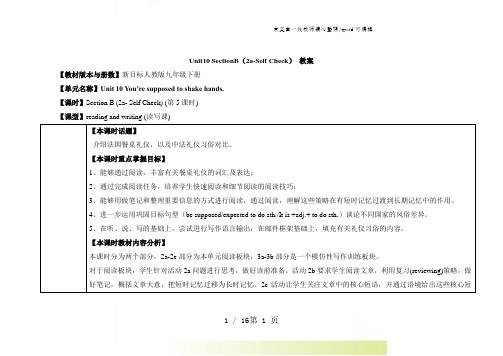
Unit10 SectionB(2a-Self Check)教案【教材版本与册数】新目标人教版九年级下册【单元名称】Unit 10 You’re supposed to shake hands.【课时】Section B (2a-Self Check) (第5课时)【课型】reading and writing (读写课)【本课时话题】介绍法国餐桌礼仪,以及中法礼仪习俗对比。
【本课时重点掌握目标】1、能够通过阅读,丰富有关餐桌礼仪的词汇及表达;2、通过完成阅读任务,培养学生快速阅读和细节阅读的阅读技巧;3、能够用做笔记和整理重要信息的方式进行阅读,通过阅读,理解这些策略在有短时记忆过渡到长期记忆中的作用。
4、进一步运用巩固目标句型(be supposed/expected to do sth./It is +adj.+ to do sth.)谈论不同国家的风俗差异。
5、在听、说、写的基础上,尝试进行写作语言输出;在邮件框架基础上,填充有关礼仪习俗的内容。
【本课时教材内容分析】本课时分为两个部分,2a-2e部分为本单元阅读板块,3a-3b部分是一个模仿性写作训练板块。
对于阅读板块,学生针对活动2a问题进行思考,做好读前准备。
活动2b要求学生阅读文章,利用复习(reviewing)策略,做好笔记,概括文章大意,把短时记忆迁移为长时记忆。
2c活动让学生关注文章中的核心短语,并通过语境给出这些核心短1 / 16第 1 页教材分析语释义,让学生找到该短语释义。
2d是对2b文本的复习,要求学生复习文本,记录法国风俗的相关信息。
2e借助2d的信息记录,对比中国和法国的餐桌礼仪,模仿范例进行语言输出,为之后的写作做准备。
对于写作板块,让学生在听、说、读的基础上,尝试有条有理地输出语言,体现写作的条理性和逻辑性。
3a是写前准备活动,它提供了真实的情境,并呈现了餐桌礼仪、家规和与人外出等相关话题,要求学生根据提示,将相关的信息填入表格,通过此形式让学生整体把握写作内容和步骤等,并运用相关的短语和表达,为3b的独立写作做准备。
2022年秋人教版英语九年级上册习题课件:Unit10You’resupposedtoshakeha

Unit10You’resupposedtos hakehands.
第一课时 Section A(1a~2d)
I. 根据句意及汉语提示补全单词
1. The little girl often kisses (吻) her mother’s face. It makes her happy.
B. will
C. could
D. may
( A)10. A. or
B. nor
C. and
D. but
II.阅读理解
Section A 话题阅读与情景交际
For the British, the home is a private place in which he or she goes to hide
I want to help as many people as possible .
2.不要对她生气,毕竟她只是一个孩子。
Don‘t be angry with her. She is only a child, after all .
3.椅子上有一些脏的东西,请擦掉它们。
There are some dirty things on the chair. Please clean them off .
—She’d like to go _______ .
A. relaxing somewhere
B. somewhere relaxing
C. relaxing anywhere
D. anywhere relaxing
( D)12. You should finish your ______ homework ______ in time.
人教版九年级英语各单元主题思维导图(1-10)
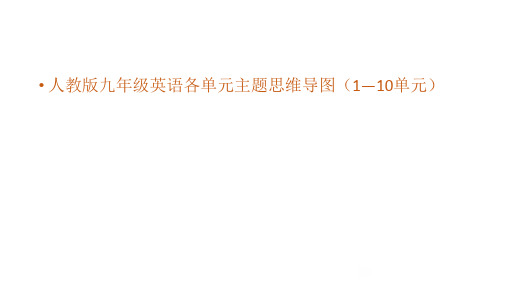
Key verbs
learn, study Improve, practice, repeat review, connect develop, discover, succeed increase, etc.
Challenges
speak too quickly (be)afraid to ask questions make mistakes in grammar can’t understand spoken English can’t get the pronunciation right don't know how to increase my reading speed don't know enough words to write well don't get much writing practice get bored ...
• 人教版九年级英语各单元主题思维导图(1—10单元)
初中英语人教版九年级全一册
Unit1 How can we become good learners?
单元主题思维导图
How Can You Become a Successful leaner?
阅读篇-Section B 2b
Section B 2b
Ask questions during or after class
Learning how to learn
单元整体话题篇
Structures
A: Do you learn English by reading aloud? B: Yes, I do. It helps with my pronunciation A: How can I improve my pronunciation? B: Well, one way is by listening to tapes.
人教版英语九年级全册Unit14SectionBReading优秀教学案例
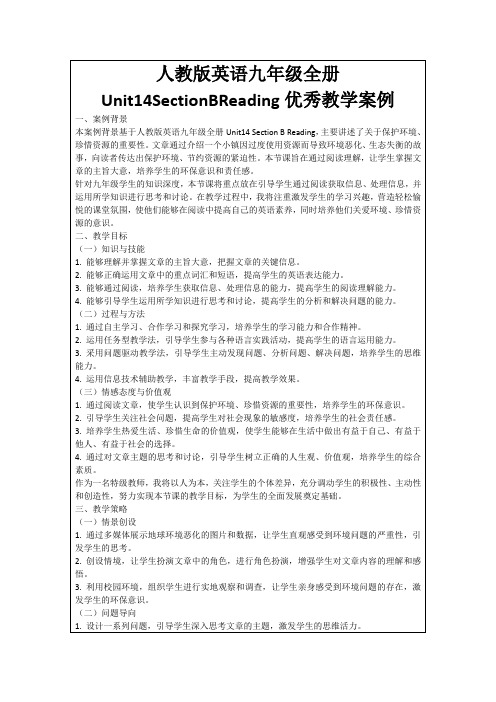
1.将学生分成小组,每组选择一个讨论话题,如文章中的环境问题、保护环境的方法等。
2.引导学生进行小组讨论,鼓励学生发表自己的观点,培养学生的合作能力和沟通能力。
3.各小组汇报讨论结果,分享彼此的思考和收获,促进学生的交流和思考。
(四)总结归纳
1.教师引导学生对文章的主旨大意进行总结,回顾和巩固所学知识。
2.运用任务型教学法,引导学生参与各种语言实践活动,提高学生的语言运用能力。
3.采用问题驱动教学法,引导学生主动发现问题、分析问题、解决问题,培养学生的思维能力。
4.运用信息技术辅助教学,丰富教学手段,提高教学效果。
(三)情感态度与价值观
1.通过阅读文章,使学生认识到保护环境、珍惜资源的重要性,培养学生的环保意识。
针对九年级学生的知识深度,本节课将重点放在引导学生通过阅读获取信息、处理信息,并运用所学知识进行思考和讨论。在教学过程中,我将注重激发学生的学习兴趣,营造轻松愉悦的课堂氛围,使他们能够在阅读中提高自己的英语素养,同时培养他们关爱环境、珍惜资源的意识。
二、教学目标
(一)知识与技能
1.能够理解并掌握文章的主旨大意,把握文章的关键信息。
3.简要介绍文章的背景和内容,激发学生的阅读兴趣,为新课的展开做好铺垫。
(二)讲授新知
1.引导学生阅读文章,让学生自主获取信息,理解文章的主旨大意。
2.对文章中的重点词汇和短语进行讲解,让学生充分理解并能够正确运用。
3.分析文章的句子结构和语法特点,提高学生的语言运用能力。
4.通过讲解和示例,使学生掌握文章中的知识点,为后续的学习和讨论做好基础。
2.设计小组讨论任务,让学生通过讨论、分享,共同完成任务,提高学生的学习效果。
人教版英语九年级全册Unit14SectionBReading说课稿

一、教材分析
(一)内容概述
本节课为人教版英语九年级全册Unit 14 Section B Reading部分。本单元围绕“节约能源,保护环境”这一主题展开,通过阅读文章、听力练习和口语交流等形式,让学生了解能源的重要性,提高环保意识。本节课在整个课程体系中具有承上启下的作用,既是对前面所学知识的巩固,也为后面学习相关环保话题打下基础。
3.家庭调查:让学生调查家里的节能措施,并撰写调查报告,培养实践能力。
作业的目的是让学生在课后继续巩固所学知识,提高语言实际运用能力,同时培养他们的环保意识和拓展知识视野。
五、板书设计与教学反思
(一)板书设计
我的板书设计将采用以下布局和风格:
1.布局:板书分为左、中、右三个部分。左侧列出关键词汇和短语,中间展示文章结构和主要观点,右侧呈现语法知识点和例句。
3.电子白板:实时展示学生的作品,便于师生互动、生生互动,提高课堂参与度。
4.小组讨论板:用于记录小组讨论过程和成果,便于分享和评价。
(三)互动方式
我将设计以下师生互动和生生互动环节:
1.师生互动:
(1)教师提问,学生回答,引导学生在思考中学习。
(2)教师示范,学生模仿,指导学生正确运用语言知识。
(3)教师评价,学生反馈,促进学生的自我完善。
2.生生互动:
(1)小组讨论:针对课文内容或拓展问题,进行小组讨论,培养学生的合作精神和批判性思维。
(2)小组分享:各组展示讨论成果,其他组进行评价,提高学生的表达能力和评价能力。
(3)角色扮演:学生模拟真实情境,进行角色扮演,提高语言实际运用能力。
四、教学过程设计
(一)导入新课
人教版英语九年级全册Unit1SectionB1a2e阅读课教学设计

四、教学内容与过程
(一)导入新课
在这一环节中,教师将通过与学生互动,自然导入新课。首先,教师可以提问学生:“Do you like making new friends?”来引起学生对人际交往的兴趣。接着,展示一组描绘不同人物特点的图片,让学生观察并讨论:“What do you think of these people? Can you guess their personalities and hobbies?”通过这种方式,激发学生的好奇心,为阅读新课做好铺垫。
1.知识与技能方面:重点是学生对文章内容的理解,特别是对文章中描述的人物特点、优缺点等方面的掌握。难点在于学生需要运用所学词汇和句型进行自我介绍和描述,以及在实际语境中运用阅读策略提高阅读效率。
2.过程与方法方面:重点是培养学生良好的阅读习惯,掌握阅读策略。难点在于如何引导学生进行有效的小组合作和讨论,提高学生的批判性思维和解决问题的能力。
(五)总结归纳
在总结归纳环节,教师将带领学生对本节课所学内容进行回顾。首先,让学生复述文章的主要内容,总结文章中描述人物特点、优缺点等方面的表达方式。然,教师强调重点知识,提醒学生注意易错点。
最后,布置课后作业,要求学生运用所学知识,描述自己或家人、朋友的优点与不足。同时,鼓励学生在课后多进行阅读实践,提高自己的英语水平。
3.情感态度与价值观方面:重点是激发学生的学习兴趣,培养其积极向上的情感态度。难点在于如何让学生在课堂中充分展示自己,增强自信心。
(二)教学设想
1.创设情境,激发兴趣:通过展示与本节课相关的图片和提问方式,激发学生的好奇心,引导学生主动参与课堂活动。
人教版九年级上册英语授课课件 SectionB (3a-Self Check)

话题与写作
名师点评
短文用“导入 +接续词法”来写。先导入自己想介绍的产品, 再用接续词来详细介绍煎饼的制作过程,最后抒发感想。
产品
by ...
I think it is ...
话题与写作
经典词句
单 wheat, corn, first, then, finally, 词 carefully, special, like, main
短 be made of/from/in, by hand, be 语 famous for, all kinds of..., think of
First, corn, wheat and beans are put into hot water after they are crushed(压碎) . Then, they are poured into a machine and become thick liquid. Next, the liquid is spread on a big pan evenly(均匀地) ,with fire under the pan. During the time, people need to look after the pancakes carefully. After a
3. ______________________________________________ _T_h_e_w__a_tc_h_e_s__a_r_e_m__a_d_e_o_f_s_t_e_el_a_n__d_t_h_e_y_a_r_e__m_a_d_e__in___ Shanghai.
课文呈现
① My town is famous for pancakes. ② Pancakes are made from corn,wheat, beans and so on. 句 ③ It’s a little complex to make pancakes. 子 ④ During the time, people need to look after the pancake carefully. ⑤ I will think of the labor and sweat that
人教新目标九年级英语Unit3 Section B 话题阅读课件

Section B 话题阅读
一、完形填空。 Being polite can help you make friends,and being rude can make you lose friends. Being polite does not seem difficult,__1__ for many people it remains a challenge.You might want to know __2__ to be a polite person.The following are two suggestions:Be gentle,not pushy.When you do something,offer something,or make a request,you do it __3__ making them feel like they are being pushed into a corner.For example,if you are having a conversation, it's OK to ask a question or offer your opinion , but it is __4__ to be pushy.Even if you're trying to help,such as offering to pay for lunch and offering to wash the dishes,don't be pushy.__5__ the person says “No, thank you” then say “Please,I'd really love to help.” If they __6__ say no, then let it go(到此为止).It is __7__ that they want to do something for you, so let them do it.You can do something for them some other time.
人教版英语9年级全册Unit9_SectionB(2a-Self_Check)教案

3a-3b部分是写作训练版块。
3a是一个写作前的思考准备,呈现了与音乐或电影相关的问题,要求学生填写信息,整理写作要点。
3b布置写作任务并且提供了相关的短语和表达,以便学生完成写作任务。
【通过本单元的学习学生需掌握哪些综合技能】
T:Now let’s enjoy a video to learn more about Chinese musical instruments.
1.通过free talk的形式复习表达喜好的句型。
2.通过图片展示乐器类型导入本课话题,吸引学生的注意力。
3. “听歌识曲”激发学生的学习兴趣,调动学生的学习热情。
3.培养学生的阅读能力和归纳能力。
4.复习that/who/which引导的定语从句的用法.
5.学会用that/who/which引导的定语从句描述自己的喜好,并能发表简单的评论。
6.学会应用本单元的知识谈论自己的喜好、感受和原因,并能在喜好上给别人提出建议。
7.会用本单元的常见句型结构写出相应的短文,提高学生的写作能力。
T:Do you know any Chinese musical instruments?
2.Show students some pictures of Chinese musical instruments and ask students to tell the names.
Brass & woodwind:dizi, xiao, suona, cucurbit flute
Then check the answers.
4.Get students find out the Attributive clauses in the passage and try to understand.
九年级英语 Unit 6 When was it invented Section B话题阅读与写作
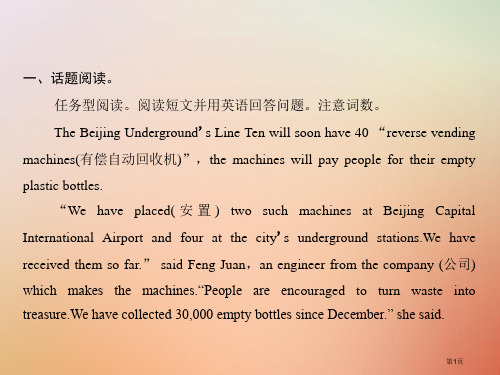
Chang Tao is the director of the company.He says that if the new project works well in the city,they will consider offering the waste-to-treasure service to other developed cities in the eastern part of China.
第4页
二、话题写作。 写作话题 请写一篇短文,谈谈你的最新发明并说出它的用途。 提示:发明了一个特殊的装垃圾的箱子,这箱子能说不同的语言,如果人们 把垃圾扔在街道,它马上打扫干净,并告诉人们不要乱扔垃圾。 写作指导 (1)此篇作文以谈论发明为主线,主要内容是谈论你发明的东西是什么,为 什么要发明它,它有什么用途,可以给人们生活带来什么影响等。写作内容 渗透着本单元的话题和语言目标,学习使用一般现在时态的被动语态。 (2)单元实用短语、句型:
人教版九年级全册英语Unit2 SectionB 知识讲解+专题练习学案(含答案)
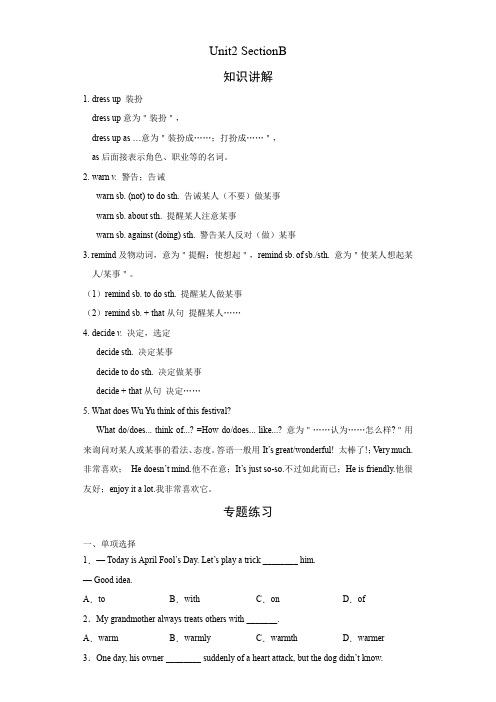
Unit2 SectionB知识讲解1. dress up 装扮dress up意为"装扮",dress up as …意为"装扮成……;打扮成……",as后面接表示角色、职业等的名词。
2. warn v.警告;告诫warn sb. (not) to do sth. 告诫某人(不要)做某事warn sb. about sth. 提醒某人注意某事warn sb. against (doing) sth. 警告某人反对(做)某事3. remind及物动词,意为"提醒;使想起",remind sb. of sb./sth. 意为"使某人想起某人/某事"。
(1)remind sb. to do sth. 提醒某人做某事(2)remind sb. + that从句提醒某人……4. decide v.决定,选定decide sth. 决定某事decide to do sth. 决定做某事decide + that从句决定……5. What does Wu Yu think of this festival?What do/does... think of...? =How do/does... like...? 意为"……认为……怎么样?"用来询问对某人或某事的看法、态度。
答语一般用It’s great/wonderful! 太棒了!;V ery much.非常喜欢;He doesn’t mind.他不在意;It’s just so-so.不过如此而已;He is friendly.他很友好;enjoy it a lot.我非常喜欢它。
专题练习一、单项选择1.— Today is April Fool’s Day. Let’s play a trick ________ him.— Good idea.A.to B.with C.on D.of2.My grandmother always treats others with _______.A.warm B.warmly C.warmth D.warmer 3.One day, his owner ________ suddenly of a heart attack, but the dog didn’t know.A.dead B.death C.died D.dying4.The teachers always ________ students not to swim alone again and again.A.prove B.warn C.allow5.Online study is greater for the students who can ________ themselves better.A.worry B.compare C.punish D.control二、完型填空Many things happening between my father and me crowded my mind. But one thing made a deep impression on me.It was a Sunday morning, and I was in a 6 (1) mood(情绪).Two of my friends had gone to the movies the night before and hadn't invited me. I was in my room .My father came in and said “It's a beautiful day.”“No! Leave me alone!” My father said nothing and left.My friends called and 7 (2) me to go to the mall with them a few hours later. I forgot to be 8 (3) with them and then went with them.When I came home, I found a note (便条) on the table.My mother put it where I would be sure to see it.“Dad has had an9 (4).When I reached the hospital, my mother came out and told me a car hit my father and his injuries were extensive(大面积的).”Your father told the driver to leave . ----”My mother may have said more,but I didn't hear.I didn't hear anything 10 (5) those terrible words: Leave me alone. How much had I hurt him 11 (6)I shouted out those words at him earlier in the day?It was several days later that he was 12 (7) able to have a talk.I held his hand gently, afraid of hurting him.“Daddy ... I am so sorry ...”“It's okay, sweet heart. I'll be okay.”“No,” I said,“I mean about 13 (8) I said to you that day.You know, that morning?”14 (9)about that day, not before, during or after the accident.I remember telling you goodnight the night before,though.”He managed a weak smile.My English teacher once told me that words have great power.They can hurt or they can heal(治愈).And we all have the power to 15 (10)6.A.good B.terrible C.peaceful7.A.led B.encouraged C.invited8.A.strict B.angry C.pleased 9.A.accident B.illness C.examination 10.A.except B.among C.towards 11.A.when B.until C.before 12.A.really B.finally C.suddenly 13.A.Saying B.word C . what. 14.A.something B.everything C.nothing 15.A.keep B.choose C.understand三、阅读单选The Spring Festival is one of the most important festivals in China. During the festival, Chinese people have many activities. They paste Spring Festival couplets(春联), greeting the New Year and saying goodbye to the old year. On the first day of the Spring Festival, people hang out, wearing new clothes. Nowadays, children get red pockets from their parents and their relatives. It is a good time for people to visit relatives and friends. More importantly, the Spring Festival is celebrated not only in China but also in other parts of the world.The Spring Festival was celebrated in the UK from 1980. Every New Year, people also get together and have lots of activities. They sing songs and share photos with friends or watch movies in the cinema. Besides, the Spring Festival has become a key time for Chinese living in the US. They join in a large evening party to welcome the traditional New Year. The Chinese New Year will be welcomed with three weeks of celebration across Australia. Thousands of people come to Sydney’s Chinatown. They enjoy fireworks and lion dances. The family dinner on New Year’s Eve is an important tradition for Chinese whether they were born in Singapore or moved there from China. They usually hold it at home because having it in a restaurant takes away the meaning of the tradition.16.According to Paragraph One, children can get red pockets from their on the first day of the Spring Festival.A.friends B.parents and relativesC.teachers D.classmates17.Which activity is not mentioned(提到) in Paragraph One?A.Hold a New Year party.B.Hang out, wearing new clothes.C.Visit relatives and friends.D.Paste Spring Festival couplets.18.The underlined word “fireworks” in the second paragraph means “” in Chinese.A.火炉工B.消防员C.烟花表演D.畅销书19.Which of the following is TRUE according to the passage?A.The Spring Festival is the most important festival in China.B.The Spring Festival is celebrated only in China.C.The Spring Festival was celebrated in the US from 1980.D.Chinese living in Singapore usually hold the family dinner on New Year’s Eve at home. 20.How many countries are mentioned except China in the passage?A.Two.B.Three.C.Four.D.Five.四、用所给单词的正确形式填空21.Which do you like ____(well) of the three traditional festivals?22.The doctor warned the young man ________ (not stay) up late any longer.23.He was pleased by the __________of his welcome. (warm)24.The tiger has been ________ (die) for a few days since the strong storm happened that day.25.I wish ____(go) right now.五、完成句子26.他过去经常一天抽一包香烟。
初中英语_九年级下Unit 8 Section B Reading教学设计学情分析教材分析课后反思

教学设计新课程标准要求通过英语阅读教学来培养学生良好的阅读习惯,引导学生掌握有效的阅读方法,促进学生阅读能力的提高。
现行初中英语教材(Junior English Go For It人教版新目标)中,阅读课文在各单元都有分布,这些阅读文章涵盖历史事件,旅游,课余生活等话题,具有篇幅长,句式复杂,词汇障碍多,教学难度大的特点。
怎样上好阅读课成为英语教师教学中所关注的一个焦点问题。
本节课为本单元的阅读板块,阅读材料是关于巨石阵的说明文。
阅读语篇涉及英国文化,还涉及一些含有连接词的复杂句子,需要引导学生在上下文语境中体会语言表达的确切含义。
本节课的重点是进一步巩固和拓展情态动词表推测的用法及通过相关的连接词理解句子间的逻辑关系,培养学生的阅读技巧。
难点是连接词在语言输出活动中的恰当使用。
教学过程Step 1 Warming up and lead-inGuessing game What might it be ?教师给学生展示了一张UFO的图片让学生用It might/ could be...进行猜测,回顾旧知识,然后引出the mysterious thing课堂观察:学生虽有好奇,但实在难以表达猜测的是什么。
有议论,但情趣和热情并没有设想中的那样高涨,老师尽力引导,学生不敢说。
思考:本单元的language goal 就是make inferences, 这位教师设置这样的guessing game旨在调动学生运用目标语言,用情态动词表示推测,同时激发学生的学习兴趣。
但对于游戏内容的设置却超出了学生的认知水平,教师给出的信息很少,学生无法很快找到合适的语言来表达。
所以,预设的有趣成了没趣,想要达到的效果没有达到。
《新课标》指出“基础教育阶段英语课程的任务是:激发和培养学生学习英语的兴趣,使学生树立自信心,养成良好的学习习惯和形成有效的学习策略”,如何有效地激发学生的学习兴趣?Guessing game 是很不错的活动,但内容要选择贴近学生学习生活的,能让每个学生都能想说而且说得出的。
- 1、下载文档前请自行甄别文档内容的完整性,平台不提供额外的编辑、内容补充、找答案等附加服务。
- 2、"仅部分预览"的文档,不可在线预览部分如存在完整性等问题,可反馈申请退款(可完整预览的文档不适用该条件!)。
- 3、如文档侵犯您的权益,请联系客服反馈,我们会尽快为您处理(人工客服工作时间:9:00-18:30)。
Section B话题阅读
一、从方框内选择适当的单词,并用其正确形式完成下面的短文。
by,taste,use,difficult,w ho,pick,learn,scoop,to,foreigner
The Chinese invented chopsticks.Chopsticks are __1__ for eating in China.When having dinner with Chinese friends,it is always better for foreigners to try __2__ how
to use ing chopsticks to eat rice is a problem for most __3__.My advice on eating rice with chopsticks is to bring your rice bowl close to your mouth and quickly __4__ the rice into it with your chopsticks.
Chinese people think you can't enjoy the __5__ of Chinese food if you don't use ing two chopsticks to __6__ up rice and little pieces of meat and vegetables is actually not a __7__ thing.In fact,there are foreigners __8__ can use
chopsticks as well as the Chinese.
According __9__ superstition(迷信),if you are given a pair of chopsticks,and the two chopsticks are not the same size __10__ accident,it means you are going to miss a boat,plane or train.Besides that,dropping chopsticks may bring bad luck.
1._used_
2._learning_
3._foreigners_
4._scoop_
5._taste_
6._pick_
7._difficult_
8._who_
9._to_10._by_
二、阅读理解。
“Life is speeding up.Everyone is getting unwell.”This may sound like
something someone would say today.But in fact,an unknown person wrote it.
Inventions can change our lives.But have all these things really improved our lives?Imagine this.You're doing your homework on the computer.Your mobile phone rings and the noise from the television is getting louder and louder.Suddenly the computer is turned off and you lost all your work.How do you feel?Inventions have speeded up our lives,but they often leave us feeling tired.
One family in England went “back in time”to see what life was like without these inventions.The grandparents,with their daughter and grandsons Ben 10 and Tom 7,spent nice weeks in an old house.They had no computers or mobile。
